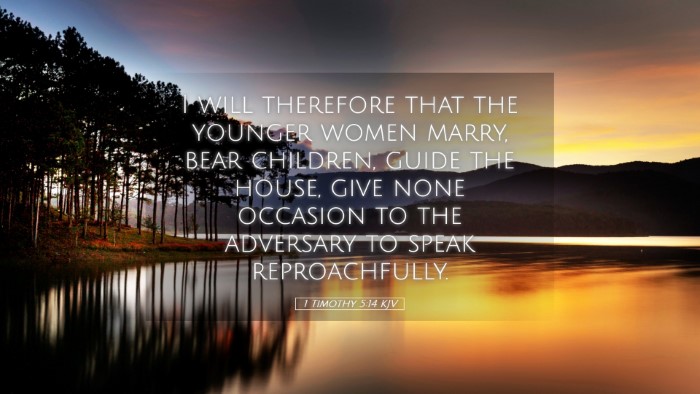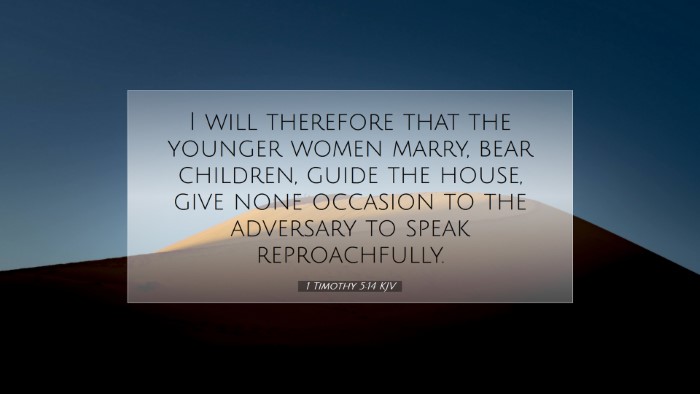1 Timothy 5:14 Commentary
Verse: "So I would have younger widows marry, bear children, manage their homes, and give the enemy no opportunity for slander." (1 Timothy 5:14, NIV)
Introduction
This verse is a part of Paul's guidance on the conduct and roles of widows within the early Church. Paul addresses practical issues for widows while emphasizing the importance of family life and spiritual community. This commentary incorporates insights from various public domain sources to deepen the understanding of the text.
Contextual Background
The context of this passage revolves around the instructions for church governance and the care for widowed women within the Christian community. Paul highlights specific challenges faced by younger widows, notably the temptations they might encounter in a society that marginalizes their status.
The Call to Marry
Paul's exhortation for younger widows to remarry stems from his concern for their spiritual and social wellbeing.
- Matthew Henry: Writes that marriage can provide stability and fulfillment, addressing the potential loneliness and temptation that widows may face. By marrying, they can contribute positively to the family unit and society.
- Albert Barnes: Suggests that Paul’s counsel is based on the idea that maintaining a family life helps protect widows from idle speculations and distractions that might lead them into spiritual trouble.
- Adam Clarke: Views marriage as a divine institution that fulfills many human needs and urges that it be encouraged as a remedy against moral failures common in a single state.
Bear Children
Paul advocates for younger widows to bear children, which underscores the value of procreation within God’s design for family and community.
- Matthew Henry: Points out that childbearing is a privilege and responsibility, amplifying the role of women as nurturers and caregivers, contributing to the church’s growth through the next generation.
- Albert Barnes: Emphasizes the role of children as blessings, suggesting that bringing forth children is aligned with God’s command to be fruitful and multiply, fostering a sense of continuity within the faith community.
- Adam Clarke: Remarks that having children extends the family's legacy, both physically and spiritually, reinforcing the bonds of faith in generational succession.
Manage Their Homes
Paul instructs younger widows to manage their homes, recognizing the significance of home life in the Christian community.
- Matthew Henry: Argues that administration of the household is a sacred duty which allows widows to exemplify Christian virtues like hospitality, charity, and stewardship.
- Albert Barnes: Stresses the importance of this role, interpreting home management as a way to demonstrate to the world the strength and beauty of a God-centered household.
- Adam Clarke: Highlights that home management is not merely a domestic task but a critical ministry, fostering the nurture of faith and morals in a home environment.
Give the Enemy No Opportunity for Slander
Paul’s warning about giving no opportunity for slander underscores his concern for the church's witness in the world.
- Matthew Henry: Reflects on how lack of focus and engagement in proper family order could lead to gossip and charge against the Christian community, depicting it as disorganized or morally lax.
- Albert Barnes: Notes that maintaining a good reputation is essential for the church's mission, as Christians are often scrutinized by skeptics who look for fault in their conduct.
- Adam Clarke: Warns against the idle hands of those not engaged in purposeful activities; such idleness can lead to temptation to be involved in quarrels and gossip, damaging the integrity of the church.
Conclusion
In 1 Timothy 5:14, Paul provides rich guidance for younger widows, calling them to marry, bear children, and manage their homes as part of their spiritual journey and community responsibility. This passage, while culturally contextual, carries timeless principles about family, responsibility, and the importance of maintaining a good Christian witness. The commentary from Matthew Henry, Albert Barnes, and Adam Clarke enriches our understanding of these roles, encouraging pastors, theologians, and students to delve deeper into the call for faithful living in all aspects of life.


